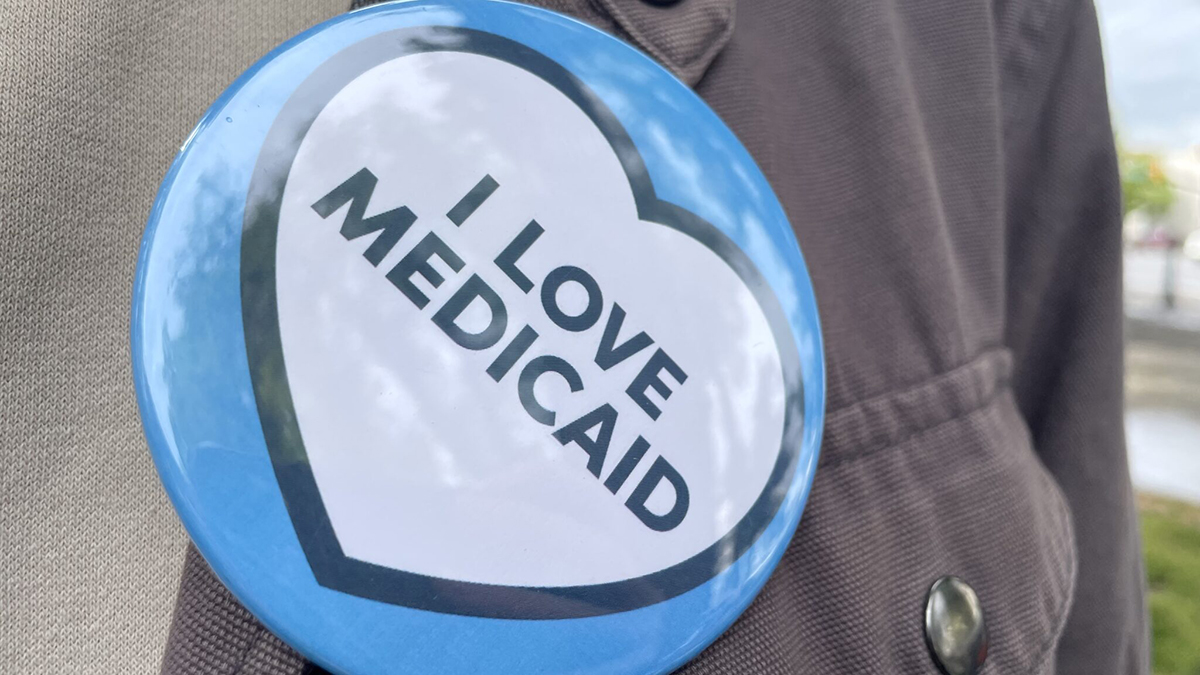Politics
Analysis: Upwards of 80K Utahns could lose health insurance under ‘big, beautiful’ bill’

A supporter wears an “I love Medicaid” button during a news conference held at Pioneer Park in Salt Lake City on May 6, 2025. Photo: Katie McKellar/Utah News Dispatch
Utah could lose an estimated $381 million from federal Medicaid cuts if Congress passes the bill as written. Though it’s a ‘moving target,’ Utah lawmakers are watching — and may need to cut Utah’s State CHIP insurance program for up to 2,000 immigrant children to prevent deeper cuts
SALT LAKE CITY, Utah – Though the full ramifications of the “big, beautiful” tax and spending bill that narrowly passed the U.S. House this week are still murky — especially since the bill is likely to change as it makes its way through the Senate — the bill as currently written could jeopardize health insurance for tens of thousands of Utahns.
Plus, states including Utah would need to grapple with an estimated $625 billion in cumulative Medicaid cuts over 10 years from work requirements, stricter eligibility rules and a pause on provider taxes — changes that would likely lead millions of Americans losing Medicaid coverage.
On Friday, officials from the Utah Department of Health and Human Services told Utah News Dispatch they did not have state-specific estimates available detailing the potential impacts of the still-evolving federal budget reconciliation package on Utah’s Medicaid program because it’s still a “moving target.”
However, according to the health policy outlet KFF, the bill could result in an estimated $381 million loss in federal Medicaid dollars for Utah. The outlet used Congressional Budget Office (CBO) estimates to unpack the potential state-by-state impacts of a $625 billion federal cut to Medicaid in an analysis posted last week.
“Cuts of $625 billion will force states to make tough choices: maintain current spending on Medicaid by raising taxes or reducing spending on other programs; or cut Medicaid spending by covering fewer people, offering fewer benefits, or paying providers less,” KFF reported.
The vast majority of the cut would come from three sources: work requirements mandating that adults who are eligible for Medicaid expansion must meet work and reporting requirements (estimated to save $300.8 billion as people become ineligible), repealing the Biden administration’s rule simplifying eligibility and renewal process (estimated to save $162.7 billion) and setting a moratorium on new or increased provider taxes (estimated to save $86.8 billion), according to KFF.
It depends on what states decide to do to respond to the cuts, but in another analysis posted Tuesday based on CBO estimates, KFF estimated the changes to Medicaid and the Affordable Care Act Marketplaces could increase the number of people without health insurance across the nation by 8.6 million.
Additionally, when combined with the effect of the expected expiration of the Affordable Care Act’s enhanced premium tax credits, the CBO expects 13.7 million more people will be uninsured in 2034, according to KFF.
“Anticipating how states will respond to changes in Medicaid policy is a major source of uncertainty in CBO’s cost estimates. Instead of making state-by-state predictions about policy responses, CBO estimates the percentage of the affected population that lives in states with different types of policy responses,” KFF noted, adding that states may choose to implement work requirements that are easier or harder to comply with, which would impact enrollment.
So KFF’s analysis included a range of enrollment impacts varying by plus or minus 25% from a midpoint estimate.
Based on the budget reconciliation bill’s changes to Medicaid, Utah is projected to see its uninsured population increase by a mid-range estimate of roughly 65,000 — somewhere between 49,000 on the low end and up to 81,000 on the high end, according to the analysis.
When combined with the expected expiration of the Affordable Care Act’s enhanced premium tax credits, KFF estimated that Utah’s uninsured population could increase by even more — roughly 150,000, or a 4% increase. That estimate could vary between 110,000 on the low end or up to 190,000 on the high end, according to KFF.
Other states would see bigger impacts than Utah, where about 350,000 total Utahns enroll in Medicaid. About half of the 13.7 million more people who would be uninsured under both policy changes live in Florida (1.8 million), Texas, (1.6 million), California (1.5 million), New York (800,000), and Georgia (610,000).
‘Devastating’: Health advocates blast bill’s House passage
Utah health advocates who have been watching the budget reconciliation bill’s progress expressed deep disappointment in its passage out of the House.
“I’ve yet to meet any Utahn who said that when they voted in November, they were looking for which candidate was most focused on kicking as many people off Medicaid,” said Stephanie Burdick, an advocate with the newly-formed Protect Medicaid Utah Coalition.
“Yet here we are,” Burdick said. “The U.S. House of Representatives passed a bill that could force almost 80,000 Utahns off their health insurance.”

The proposed federal cuts also come as Utah state officials — anticipating the Republican-controlled White House and Congress’ appetite to implement work requirements on Medicaid — are considering a waiver to impose work requirements on Utah’s adult Medicaid adult expansion population.
About 75,000 Utahns have enrolled in Utah’s Medicaid expansion program, an estimated 7,500 (10%), would not qualify for an exemption and be subject to the work requirements. That means that if they don’t start working or submit documents showing they’re applying for at least 48 jobs during a three-month period, they could lose their medical coverage.
Between Utah’s proposed work requirements and the proposed federal Medicaid cuts, Burdick said state officials and federal politicians in D.C. are “both deadset on one thing: increasing the number of uninsured Utahns and squeezing more time and more money out of working families.”
“How is this aligned with Utah values?” Burdick said, urging Congress to “go back to the drawing board and find ways to increase access and affordability to health care for all Americans and this is the opposite.”
Nate Crippes with the Disability Law Center, also a member of the Protect Medicaid Utah Coalition, issued a statement saying health advocates “remain concerned about the devastating impact of the billions of dollars in Medicaid cuts on Utahns with disabilities.”
“Numerous provisions in this bill would be harmful to the disability community, including a work requirement that penalizes Medicaid beneficiaries for losing a job, and will strip health coverage from millions nation-wide, including many Utahns,” Crippes said.
He added that given the focus on people enrolled in Medicaid expansion, “we are particularly concerned with the impact on those with mental illness and substance use disorder, who make up nearly 60% of the expansion population.”
“We see no beauty in a bill that denies healthcare to millions, shifts costs to the states and the middle class, and weakens our entire healthcare system,” he said. “So we urge our senators to support the disability community, protect Medicaid, and stop this bill from passing.”
President Donald Trump and Republicans in Congress have lauded the bill as needed to curb government spending, cut taxes and provide resources to execute Trump’s agenda around immigration, energy production and increased military investment.
Democrats criticized the bill as a tax cut that would largely benefit the billionaire class and lead the U.S. to raise its debt limit by $4 trillion.
How will Utah respond to Medicaid cuts if they pass?
Utah’s Medicaid Director Jennifer Strohecker briefed Utah lawmakers this week on the status of Utah’s Medicaid program, proposed changes including the state’s version of work requirements, and possible impacts from the budget reconciliation bill if it receives final passage.
“Utah has the lowest Medicaid enrollment of every state, but for the 350,000 Utahns that do receive their health benefits through this program, it is a lifeline for preventive care, institutional care when it’s needed, physical health, behavioral health,” she told the state Health and Human Services Interim Committee on Wednesday.
An estimated 1 in 10 Utahns are enrolled in Medicaid, she said. One in 6 babies are born with Medicaid as their health coverage.
In total, Utah’s Medicaid program costs about $5.3 billion per year. More than 64% of it is funded with federal dollars, equaling $3.4 billion. About $1.7 in state dollars pay for the rest.
Lawmakers including Rep. Tyler Clancy, R-Provo, and Rep. Ray Ward, R-Bountiful, asked Strohecker about Utah’s proposed work requirement waiver and questioned whether it will lead to Utahns losing coverage due to administrative burdens.
“This was not meant to be an administrative hurdle or a barrier. This was not meant to take people off of the Medicaid program,” she said of Utah’s proposal.
While Strohecker noted the federal proposal has a “pretty big dollar figure tied to work requirements as it’s proposed, Utah’s design did not have that intent.”
“So it is our commitment to look at what are those administrative hurdles, what are those barriers, as it’s designed today, and thoughtfully work through those with you all and with our partners at DWS,” she said, noting that Utah’s proposal is still being drafted using feedback from public comment.
Though the original public comment period for Utah’s proposed work requirements waiver was initially scheduled to end Thursday, state officials told Utah News Dispatch they decided to extend it through June 2, with one more public hearing scheduled for Tuesday.
“We have received a lot of helpful feedback and will consider those recommendations before submitting the request to (the federal government) within a month or two of closing the public comment period,” a Utah Department of Health and Human Services spokesperson said in an email.
However, Strohecker noted that Utah’s waiver and the federal mandates included in the budget reconciliation package are two different proposals. The proposed federal mandated work requirements would require Americans to “complete work requirements before you ever get Medicaid.”
The federal proposal has the potential to risk loss of health coverage for tens of thousands more Utahns than the state’s work requirement waiver, as currently drafted.
Additionally, if Congress approves the bill as currently drafted, it included a provision that would penalize states that expanded coverage for immigrants by reducing the federal Medicaid matching rate for the Medicaid expansion program from 90% to 80% for states that either provide health coverage or financial assistance to purchase health coverage to certain groups of immigrants.
Last year, Utah started offering health insurance to noncitizen children through its State Children’s Health Insurance Program, or State CHIP. As of last week, 1,317 children were enrolled in that program, which has the capacity to cover up to 2,000 kids, according to the state’s website.
Strohecker said that if the federal government penalizes Utah for its State CHIP program and reduces its state match from 90% to 80%, that would trigger a law to “terminate” Utah’s adult Medicaid expansion program. She said lawmakers may need to consider what to do about that.
That may include repealing the State CHIP program for 2,000 kids in order to save Utah’s Medicaid expansion program, which covers 75,000 adults.
Rep. Steve Eliason, R-Sandy, acknowledged the federal bill is “constantly evolving,” so state leaders will need to watch what happens, but he said “assuming this bill passes, if this provision is left in there,” lawmakers may need to repeal State CHIP.
“I think it’s a really simple policy call, myself, that we need to sunset the (State CHIP) program that would trigger the 10% penalty as well as our trigger law, because that would be a domino effect,” Eliason said. “This is not making a policy comment on the underlying legislation, it’s just that our hands would be tied, and it would be, I think, the greatest good for the greatest number.”
Senate Minority Leader Luz Escamilla, D-Salt Lake City, also acknowledged that the federal budget package is a “moving target, so who knows what it’s going to look like in the next week.” But she asked whether the Utah Legislature would need to convene in a special session to deal with fallout if the bill receives final passage before lawmakers’ next general session in January.
Strohecker said that’s a possibility.
“We’ve been keeping a very close eye on this legislation,” she said.
Clarification: This story has been updated to reflect on all references that the Utah insurance program for noncitizen children that may need to be repealed if federal Medicaid cuts are enacted is the State CHIP program, not the national CHIP program.


















